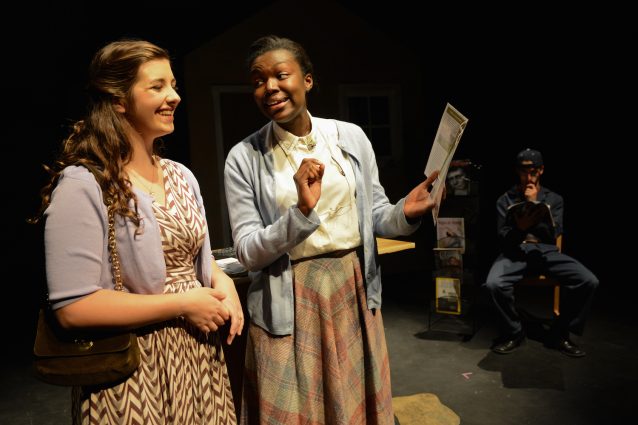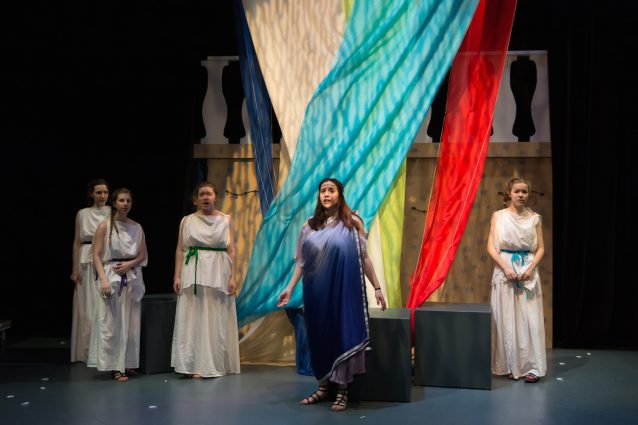Catching up with David Minton is not easy. The artistic and executive director of the Silver Spring-based Lumina Studio Theatre is a busy guy. In addition to directing, Minton teaches stage combat and writes plays. Nevertheless, Minton generously responded to CultureSpotMC.com’s questions during Lumina’s 20th anniversary year.

What do you think distinguishes Lumina from all other theater groups?
Lumina is a unique package of three traditions not usually found in most any one adult or youth program (none that I have encountered in my 40 years of professional theatre):
* We are a youth theatre COMPANY. We perform all year long. Having a 90 percent retention rate, our actors have the continuity of performing in a professional theatre setting from ages 8 to 18. For several of our older actors, this means hands-on directing experience as well. By the time our actors enter college, they have years of experience few of their contemporaries can match.
* We specialize in Shakespeare. Great attention is paid to technique, both voice and movement. It is an accepted truism that training in Shakespeare is the best technical training an actor can receive.
* We are a highly imaginative production company. Setting ‘Measure for Measure’ in the Mideast conflict, ‘The Merchant of Venice’ in McCarthy-era Hollywood, or ‘Hamlet’ in a giant dollhouse, we seek to explore what theatre can be for a modern audience.
Actors respond to the above. Consciously, most young people want to perform; perhaps subconsciously, they understand they are getting attention and training they can’t get anywhere else.
On the professional level, that is, regarding Lumina specifically, how did you negotiate losing Jillian Raye (Minton’s late wife and Lumina founder)? Did you have assistance and support from within and without Lumina?
When Jill passed–even though her decline happened over the course of a year–it was like a tsunami hit Lumina. And we are still feeling the effects–at least I am–years after. She is irreplaceable. She founded Lumina and developed its fundamental concepts and structure. I realized I would have to be a caretaker of her vision, but also add my own approach and ideas.
Given the continued high retention rate, good reviews and positive audience responses, it would seem we have been successful in this transition. But I would say the main two reasons Lumina survived is because of Julie Reiner, our managing director, and a very supportive board of directors. Without Julie’s persistence, talent and loyalty, this ship would have quit running years ago. She is one in a million.
I have also been lucky in being able to develop an elite group of young assistant directors who can take over many of the directing chores of blocking a scene, coaching actors and watching run-throughs for notes. They are invaluable to me in rehearsals. So, yes, I have had wide support from creative, generous individuals in and outside of Lumina. In particular, Montgomery County has been supportive of the Consortium of Theatres (Lumina was a founder) taking over the management of the Silver Spring Black Box Theatre. This establishment of a true “home” for Lumina was a big step in our development.

In what areas has Lumina changed and stayed the same in the nine years since Jillian’s passing?
Lumina has become more traditionally ‘professional’ than it was in Jillian’s day. We adhere to certain professional rules, standards and traditions more now. Jill was a rule-breaker and madcap improviser. That’s just not my style. As an example, Jill loved outdoor settings, found spaces, etc. for productions believing the magic of theatre could happen anywhere. I crave a professional space with lights, sound, video at my fingertips. And I probably think more about the audience than Jill did. She was fearless; if she liked her ideas, she would pursue them. I need the audience approval. Both approaches are valid.
Your talents include directing, producing, acting, playwrighting, nurturing young talent and even stage combat. What is your strongest suit? Is there anything else you’d like to try?
I enjoy all aspects of production, but I would have to say my strongest suit is directing and, specifically, coaching actors. And to be really specific, coaching monologues in Shakespeare. I would say my years of graduate work in English literature combined with my years as director are a fruitful combination in this regard. Having done everything in theatre but build sets and construct costumes, I think I have pretty much covered the spectrum. I would like to “get back to my roots” and spend more time acting. Once upon a time, I considered myself a pretty fair performer, and I would like to see if I could grow beyond what I could bring to the stage many years ago. There is such an immediate rush with acting in front of a live audience you can’t get anywhere else.

How do you think Lumina brings a love of Shakespeare to new audiences?
I believe that current audiences now look forward to and our new audience members discover a sense of ‘something happening’ in the currents of Shakespeare theatre–right here in the Silver Spring Black Box Theatre–both in growing a new generation of actors and in birthing a new generation of audiences who respond and relish Shakespeare
What has been your favorite acting role? your favorite Lumina production?
My favorite role as an actor was the character of Tusenbach in Chekhov’s ‘Three Sisters”. Such a beautiful, haunted and desperate character underneath, while maintaining a steady upbeat surface as he despairs over unrequited love. This role stamped on me a lifelong love of Chekhov’s plays. Such a different playwright in style from Shakespeare, but just as fascinated with all aspects of the human condition.
My favorite Lumina production? So hard to say. A bit like trying to answer who is your favorite child. But I have, off the top of my head, very fond memories of ‘Three Sisters’ and ‘The Penelopiad’ by our Ensemble, ‘The Electric Man/Landslide’ by our summer actors, and ‘Henry VI,’ (Parts 1, 2 and 3) in our Shakespeare productions. But all our productions hold a place in my heart and memory.
What do you like about working with young people?
Young people always surprise me. Their energy, attitudes and passions are different from adult actors. Of course, there is nothing quite like seeing a fully staged, handsomely mounted production of a good play by trained professional actors. Talent and long dedication to the craft of acting WILL show! But young performers have ‘something new’ in their performances that is often beyond duplication by the finest actors. It’s difficult to put into words, but once you have experienced it as an audience member, it stays with you.

About what percentage of Lumina youth pursue theater professionally?
I would say perhaps 5 to 10 percent of Lumina actors go on to ‘the theatre business.’ Some will achieve a BFA in theatre and move on to other pursuits; some will go on to work in a major city for some time in hopes of making it; for some–like it was for Jillian and me–it will be a passion that will guide them all their lives.
How have Shakespeare scholars and actors Kelly and John O’Connor changed/enriched Lumina and your job as Lumina’s leader?
Editor’s Note: The O’Connors, close friends and colleagues of both Minton and Raye, have been working in various capacities with Lumina since its early days in Takoma Park. According to Kelly, “Lumina teaches not only great theatre discipline, but also such important life skills as courtesy, creativity and generosity. This last is a quality that both of its founders demonstrated from the start—Jillian’s lavishly-designed costumes helped students bring their characters to life, and David’s readiness with praise helped many a quaking young actor conquer stage fright. Both, too, brought huge enthusiasm to a project that began with rehearsals (and even performances) in their basement, to the 20-year-old local treasure it has become.”
John and Kelly have added profound texture and talent to Lumina: in the creation of our adult company (Lumina Theatre Group); John’s stage adaptations of classic literature for Lumina (Dickens’ ‘Our Mutual Friend,’ Chaucer’s ‘Canterbury Tales’ and Wodehouse’s ‘What Ho, Jeeves,’ to name a few); Kelly’s direction and brilliant costumes for Theatre Group shows, and wonderful production for Lumina of Shakespeare’s ‘Pericles,’ which allowed me a sabbatical (and the marriage and honeymoon with my wonderful wife Kathi).
But even more than that, John and Kelly provide scholarly insights into Shakespeare that are far beyond what I bring to the table. I can’t say enough about their contribution to the rich tapestry that has been woven over the years with Lumina.

What are your plans for Lumina and yourself for the future?
Lumina is on solid footing at the present: financially, artistically, and with our reputation in Silver Spring and the county at large. We have achieved much in our 20 years and we look forward to beginning our next 20. While it’s hard to predict what the future will be, we can name some things we would like to develop further:
* Greater involvement with the day-to-day life and concerns of our community. How can our theatre company make a unique contribution?
* Greater diversity of young people involved across the demographic spectrum. Lumina should continue to expand its mission of being of safe and creative space for all young people who have an interest in theatre
* More collaborations with arts organizations (as we have done in the past with Pyramid Atlantic) and tie-ins with area businesses
* Looking to transition to the next generation of artists who will make up our production team of the future
* Looking to tour special productions to area schools, theatre companies and festivals.
* Develop our adult and alumni companies further so that Lumina will one day feature a range of programming by youth, post-college and adult.
These are just some of the possible goals for a future Lumina. For myself, I hope to continue expanding the practice and perception of what classical theatre can be for our performers and our audiences.
For more information about Lumina, visit www.luminastudio.org or view their profile on CultureSpotMC here.